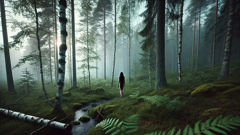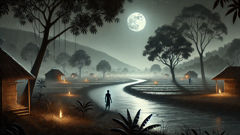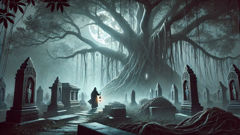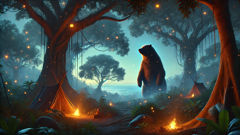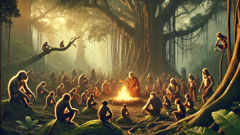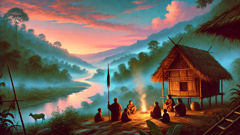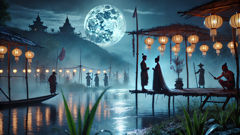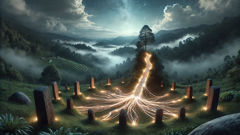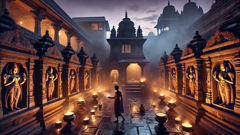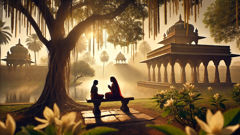Introduction
In the whispering forests of Värmland, where silver mist rises from mossy ground and birch trees shimmer like spirits at dawn, stories have always clung to the air like dew. Among the oldest and most beguiling is the legend of the Skogsra—a forest maiden as beautiful as the moonlit river, yet as elusive as the wind through pine needles. Local woodcutters and lonely herders, their faces creased by hard winters and hidden fears, still speak her name with a shiver. Some claim they’ve glimpsed her walking barefoot across the leaf-carpeted ground, her hair tangled with fern and lichen, eyes brighter than lake water. Yet for all her beauty, the Skogsra is never quite what she seems. Her back is hollow, her heart unknowable, and those who follow her into the shadows rarely return unchanged. The tale that follows is stitched from memories and warnings, a tapestry of longing, loss, and the eternal wildness at the heart of Sweden’s forests. Through the eyes of a skeptical young forester named Erik, we are drawn into a world where the boundaries between man and nature blur, and every path beneath the trees may lead to wonder—or ruin.
Whispers in the Woods
Erik Svensson had always prided himself on his practicality. He’d grown up in a family of woodcutters, his hands callused from axes and saws, his mind shaped by the sensible rhythm of seasons. The village of Skogsbyn—little more than a huddle of wooden cottages crouched at the forest’s edge—was a place of traditions and quiet superstition. But Erik had never believed in stories. He’d laughed when old men whispered of trolls under roots or the shimmering Näcken luring swimmers to drown. For Erik, the forest was just timber and mushrooms and the occasional flash of a fox’s tail. All that changed the autumn his father died.
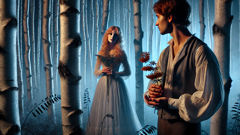
The forest, in those days, felt different. Erik’s mother wore black and lit candles at dusk, murmuring prayers to saints and spirits alike. Neighbors left offerings of bread and salt at the crossroads. Erik, restless with grief and the burden of providing for his family, spent long hours among the trees. There, the air was cool and heavy with scents of pine resin and damp moss, sunlight breaking through in slender gold shafts. Yet a strange hush seemed to follow him, as if the woods themselves were holding their breath.
It was during one such afternoon that Erik first heard the singing. He’d wandered farther than usual, tracking the call of a thrush or maybe just his own thoughts, when a voice drifted through the leaves. It was impossibly clear—neither bird nor wind, but something that made his heart stumble. The melody danced, wordless and wild, rising and falling with the breeze. Erik found himself moving toward it, half-unaware, until the song vanished as suddenly as it had begun.
Afterward, he told himself it was nothing. But the next day, he heard it again—closer this time. Curiosity sharpened into hunger. Each time the voice called, Erik followed. He glimpsed flashes: a white shape moving between trunks, laughter echoing like water over stones. Once, he found a strand of golden hair caught on a bramble, shimmering in the slanting light. It was then he remembered the old tales: the Skogsra, queen of the forest, whose beauty could snare a man’s soul and whose embrace left him hollow as her own back.
He tried to shake off the fear, but it clung to him. Each night, Erik dreamed of eyes glinting among ferns, of hands beckoning from the shadows. The village elders noticed his distraction. Old Mårten, whose face was as wrinkled as a dried apple, pressed a sprig of rowan into Erik’s palm. “Keep this close,” he whispered, voice rough as gravel. “The Skogsra hunts the lonely.”
For days Erik resisted the urge to return. But grief is a sly companion, and loneliness a deep ache. One twilight, when the mist curled thick among the birches and the air hummed with expectation, Erik found himself wandering back into the heart of the forest. This time, when the singing began, he did not hesitate.
The Hollow-Backed Maiden
The forest closed behind Erik like a velvet curtain. Each step muffled on the springy moss, he felt the familiar woods twist into a place both known and utterly strange. The trees arched overhead in a cathedral of branches, shadows pooling thick at their roots. The song was louder now, impossibly sweet, threaded with longing and laughter.
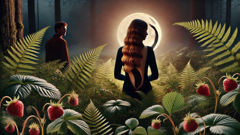
He came upon a clearing edged with ferns and wild strawberries. There, in the center, stood a woman unlike any he had ever seen. Her hair spilled over her shoulders in a tangled gold river, flecked with green leaves and silver lichen. Her skin glowed pale against the dusk, her eyes bright and deep as a mountain lake. She wore a dress woven from moss and spider silk, clinging damply to her lithe form. But it was her back that made Erik’s breath catch—a strange, hollow curve, like the trunk of a tree eaten by time and beetles, hidden beneath cascading hair.
The woman turned, smiling with a warmth that sent shivers through him. “You’ve come far, Erik Svensson,” she said, her voice as musical as the stream nearby. “Why do you walk alone in the woods?”
He meant to answer with bravado, to scoff at superstition, but words tangled on his tongue. Instead, he found himself confessing his grief, his father’s death, his sleepless nights. The Skogsra—he knew it must be her—listened with a gentle patience, her gaze never leaving his face. As she moved closer, Erik caught the wild scent of earth and rain. Her hand reached out, cool and soft, to trace his cheek. “Grief draws many into my forest,” she whispered. “Some find comfort. Some never return.”
Time seemed to melt away in her presence. Erik felt his sorrow ease, replaced by a strange exhilaration. They wandered together beneath ancient oaks, her laughter mingling with the wind. She showed him hidden springs and nests of sleeping owls, secret places where deer drank by moonlight. Once, she led him to a ring of mushrooms, where fireflies rose like sparks. Erik forgot the world beyond the trees; forgot hunger, fear, even the ache in his heart.
But always, when he glimpsed her from behind, he saw the hollow—a darkness that made his skin prickle. He tried to look away, to focus on her beauty and kindness. Yet the emptiness in her back seemed to echo his own losses, his own longing for something lost.
One night, as they rested beneath a canopy of stars, Erik dared to ask: “Why are you hollow?”
The Skogsra’s eyes grew distant. “It is the price of belonging to the forest. To love the wild is to be forever apart—never quite woman, never quite spirit.” She smiled sadly. “Those who love me must learn to live with absence.”
Her words haunted Erik long after the moon set. He wondered what it meant to love something wild and untamable—to lose himself in beauty that could never truly be his.
The Bargain and the Chase
As autumn deepened, Erik became a man divided. By day he worked among the living—felling trees, stacking firewood, nodding to neighbors whose eyes now seemed wary. By night he wandered with the Skogsra, drawn ever deeper into her world of moss and shadow. Each morning he woke with leaves in his hair and the taste of wild strawberries on his tongue, uncertain whether his adventures were dream or memory.
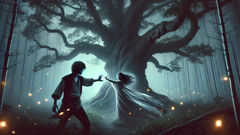
His mother grew gaunt with worry. The villagers began to whisper, casting sidelong glances as Erik passed. Old Mårten shook his head and muttered about men who lose themselves to the forest. Yet Erik could not stay away. The Skogsra’s laughter echoed in his mind; her touch lingered on his skin like dew. He wanted her, feared her, needed to understand her.
One evening, as frost silvered the grass, Erik asked if she would come home with him—leave the woods, become flesh and blood. The Skogsra smiled, her eyes reflecting starlight. “I cannot live in your world,” she said softly. “But you may choose to live in mine.” She offered him a bargain: give up all memory of home and kin, and stay with her forever beneath the ancient trees.
Erik’s heart battled his head. He thought of his mother’s lonely cottage, the warmth of a hearth, the shape of his father’s axe in his hand. He thought of the Skogsra’s wild beauty, the freedom of endless night and song. In the end, love—no matter how reckless—won out. He followed her deeper still, past places he’d never seen, into a part of the forest where the air tasted strange and the trees seemed to watch with knowing eyes.
But the forest had rules, and those who broke them rarely escaped unscathed. On the third night after his choice, Erik woke alone in a ring of mushrooms, the Skogsra gone. The woods pressed close, thick with fog and silence. Panic clawed at him. He called her name until his voice cracked, but only owls answered.
He stumbled through brambles and over hidden roots, heart hammering. The path twisted; landmarks vanished. For hours—maybe days—he wandered in circles, growing weaker and more desperate. At last, in a feverish half-dream, he found himself at the foot of a massive oak. There, the Skogsra appeared once more, her hair tangled with leaves, her eyes fierce and sad.
“You cannot stay,” she told him gently. “The forest keeps what it loves—but it also knows when to let go.” She pressed a kiss to his brow, cool as river water. In that instant Erik saw everything: his mother waiting at the door, the faces of friends lost to time, the ache of longing that would never truly fade. When he opened his eyes, the Skogsra was gone—and the way home lay clear before him.
Conclusion
Erik returned to Skogsbyn changed. He carried the silence of the forest within him—the memory of the Skogsra’s laughter, the ache of beauty glimpsed and lost. He spoke little of what had happened, for who would believe him? Yet he cherished small things: the warmth of his mother’s embrace, the crackle of a fire on cold nights, the way sunlight danced on dew-laden grass. Sometimes, as twilight deepened and mist rose from the fields, Erik caught a familiar melody drifting through the trees. He never followed it again. Instead, he planted rowan by his door and left offerings at the forest’s edge—tokens of gratitude and respect for the wild things that lived beyond human understanding.
Over time, Erik grew into a man both wise and wary. He taught his children to honor the woods, to listen for hidden songs but never chase them blindly. The legend of the Skogsra endured, woven into the fabric of village life—a warning, a promise, a reminder that the world is deeper and stranger than it seems. And deep in the heart of Värmland, where shadows pool beneath ancient trees, the Skogsra still wanders. Some say she weeps for what she cannot have; others that she laughs at mortal folly. But all agree on one thing: those who meet her never forget. For in loving the wild, we are changed—made both fuller and more hollow, like the forest itself.

